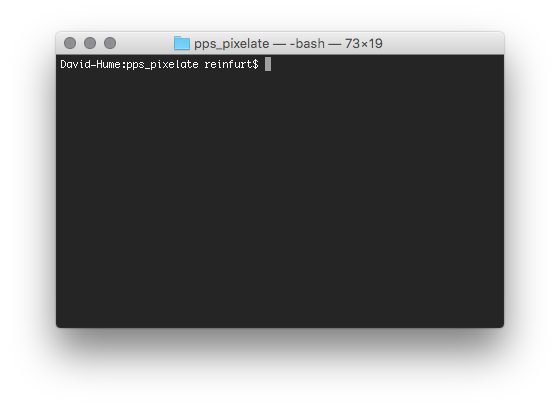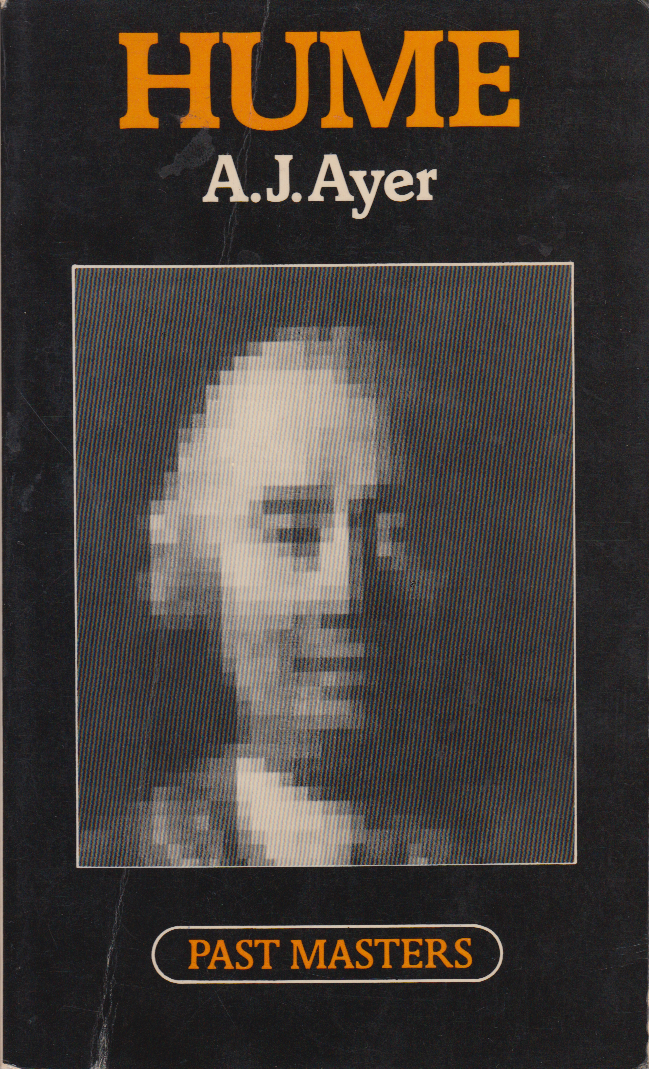c,
ok, well that above may be a bit of a stretch, and could likely yet be considerably more simply said. but it is a useful start for me anyway. id actually relish the chance to make it clearer and more more concise.
\*but\* i am also including two page scans and an image which are for you not for a broader audience. i realized that while working on this from the comfort of my computer's command-line which i stare at while programming the various bits, that the genesis of all this was right in front of me. if you look below at this obscure image of my commandline prompt, you see that the name i gave to my computer is "David Hume." anyway, that scottish enlightenment ur-empiricist philosopher is a big one for me.
 of course, david hume’s philosophy is completely concerned with perceptions as the base-level of reality. so to very crudely capsule some of what he wrote: he was convinced that the world only arrives to us through our perceptions of it. these are the primary, in fact the only reliable, data for understanding reality. he goes at least one, maybe two steps further to assert that “reality” is in these collections of perceptions. there is no futher truth beyond what the individual subject can and does perceive. and that this perception has its limits. he suggests that there is some point past which we are, for example, able to perceive something as existing. and that this smallest possible perceptual atom is, in fact, a concrete reality. further, that the perceptions are not continuous, that is there are perceptual steps in a gradient of colors (for example) and that these steps *are* the reality of a transition from one (for example) color to another. he was truly discrete, truly digital, through and through in his arguments.
he was also the most hardline of empiricists, insisting on the absolute priority of perceptions above any other kind of truth claim. (sorry, id guess this sounds like a lit of explanation, “mansplaining” is a term that jumps to mind — it is not that i know any of this so well, it is only that it is quite useful to try to write it out. i hope your patience supports me on this.) anyway, some years ago, i came across this book cover for a book that more fully summarizes what hume was after:
of course, david hume’s philosophy is completely concerned with perceptions as the base-level of reality. so to very crudely capsule some of what he wrote: he was convinced that the world only arrives to us through our perceptions of it. these are the primary, in fact the only reliable, data for understanding reality. he goes at least one, maybe two steps further to assert that “reality” is in these collections of perceptions. there is no futher truth beyond what the individual subject can and does perceive. and that this perception has its limits. he suggests that there is some point past which we are, for example, able to perceive something as existing. and that this smallest possible perceptual atom is, in fact, a concrete reality. further, that the perceptions are not continuous, that is there are perceptual steps in a gradient of colors (for example) and that these steps *are* the reality of a transition from one (for example) color to another. he was truly discrete, truly digital, through and through in his arguments.
he was also the most hardline of empiricists, insisting on the absolute priority of perceptions above any other kind of truth claim. (sorry, id guess this sounds like a lit of explanation, “mansplaining” is a term that jumps to mind — it is not that i know any of this so well, it is only that it is quite useful to try to write it out. i hope your patience supports me on this.) anyway, some years ago, i came across this book cover for a book that more fully summarizes what hume was after:
 so hume’s discrete, digital, perceptual orientation led to some pretty radical ideas about how time works. he reasoned something like “if the world only exists through its perceptions by a subject (ie, objects as such dont properly exist) then it follows (via many twists and turns) that cause and effect are not as tightly linked as we have been brought along to think. and further, if the world is only built from discrete perceptions ("sense reports”) and objects dont as such exist, then time (like things) can only exist as it is perceived. time is then, according to hume, actually PRODUCED by changes in our perceptions. so time is manufactured by our perceptions of how things change. here is a money page from hume’s major work on the matter:
so hume’s discrete, digital, perceptual orientation led to some pretty radical ideas about how time works. he reasoned something like “if the world only exists through its perceptions by a subject (ie, objects as such dont properly exist) then it follows (via many twists and turns) that cause and effect are not as tightly linked as we have been brought along to think. and further, if the world is only built from discrete perceptions ("sense reports”) and objects dont as such exist, then time (like things) can only exist as it is perceived. time is then, according to hume, actually PRODUCED by changes in our perceptions. so time is manufactured by our perceptions of how things change. here is a money page from hume’s major work on the matter:

 see you tomorrow at 10.
d
*
Go back
see you tomorrow at 10.
d
*
Go back
 of course, david hume’s philosophy is completely concerned with perceptions as the base-level of reality. so to very crudely capsule some of what he wrote: he was convinced that the world only arrives to us through our perceptions of it. these are the primary, in fact the only reliable, data for understanding reality. he goes at least one, maybe two steps further to assert that “reality” is in these collections of perceptions. there is no futher truth beyond what the individual subject can and does perceive. and that this perception has its limits. he suggests that there is some point past which we are, for example, able to perceive something as existing. and that this smallest possible perceptual atom is, in fact, a concrete reality. further, that the perceptions are not continuous, that is there are perceptual steps in a gradient of colors (for example) and that these steps *are* the reality of a transition from one (for example) color to another. he was truly discrete, truly digital, through and through in his arguments.
he was also the most hardline of empiricists, insisting on the absolute priority of perceptions above any other kind of truth claim. (sorry, id guess this sounds like a lit of explanation, “mansplaining” is a term that jumps to mind — it is not that i know any of this so well, it is only that it is quite useful to try to write it out. i hope your patience supports me on this.) anyway, some years ago, i came across this book cover for a book that more fully summarizes what hume was after:
of course, david hume’s philosophy is completely concerned with perceptions as the base-level of reality. so to very crudely capsule some of what he wrote: he was convinced that the world only arrives to us through our perceptions of it. these are the primary, in fact the only reliable, data for understanding reality. he goes at least one, maybe two steps further to assert that “reality” is in these collections of perceptions. there is no futher truth beyond what the individual subject can and does perceive. and that this perception has its limits. he suggests that there is some point past which we are, for example, able to perceive something as existing. and that this smallest possible perceptual atom is, in fact, a concrete reality. further, that the perceptions are not continuous, that is there are perceptual steps in a gradient of colors (for example) and that these steps *are* the reality of a transition from one (for example) color to another. he was truly discrete, truly digital, through and through in his arguments.
he was also the most hardline of empiricists, insisting on the absolute priority of perceptions above any other kind of truth claim. (sorry, id guess this sounds like a lit of explanation, “mansplaining” is a term that jumps to mind — it is not that i know any of this so well, it is only that it is quite useful to try to write it out. i hope your patience supports me on this.) anyway, some years ago, i came across this book cover for a book that more fully summarizes what hume was after:
 so hume’s discrete, digital, perceptual orientation led to some pretty radical ideas about how time works. he reasoned something like “if the world only exists through its perceptions by a subject (ie, objects as such dont properly exist) then it follows (via many twists and turns) that cause and effect are not as tightly linked as we have been brought along to think. and further, if the world is only built from discrete perceptions ("sense reports”) and objects dont as such exist, then time (like things) can only exist as it is perceived. time is then, according to hume, actually PRODUCED by changes in our perceptions. so time is manufactured by our perceptions of how things change. here is a money page from hume’s major work on the matter:
so hume’s discrete, digital, perceptual orientation led to some pretty radical ideas about how time works. he reasoned something like “if the world only exists through its perceptions by a subject (ie, objects as such dont properly exist) then it follows (via many twists and turns) that cause and effect are not as tightly linked as we have been brought along to think. and further, if the world is only built from discrete perceptions ("sense reports”) and objects dont as such exist, then time (like things) can only exist as it is perceived. time is then, according to hume, actually PRODUCED by changes in our perceptions. so time is manufactured by our perceptions of how things change. here is a money page from hume’s major work on the matter:

 see you tomorrow at 10.
d
*
Go back
see you tomorrow at 10.
d
*
Go back